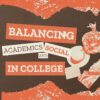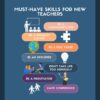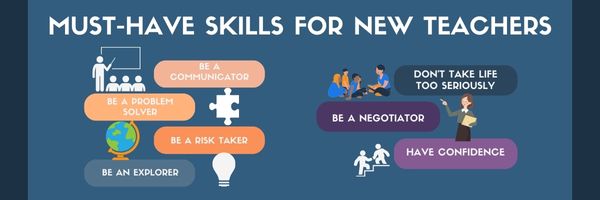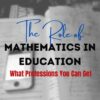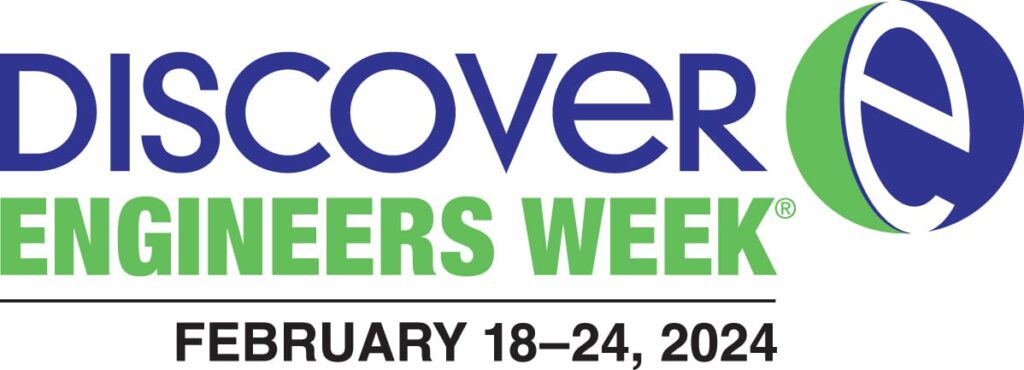Year: 2024
Balancing Academics and Social Life in College
Balancing academics and social life in college is a bigger challenge than it sounds like. As this school year approaches an end and students start to plan on college life, the Ask a Tech Teacher team has suggestions on how to make that work well:
Balancing Academics and Social Life in College
College life is an exhilarating journey filled with learning, discovery, and growth. It’s a unique phase where you’re expected to juggle academics, social activities, part-time jobs, and perhaps even self-care routines. Finding the perfect balance between academics and social life is akin to walking a tightrope. It requires skill, patience, and a bit of a balancing act. So, how does one navigate through this without tipping over? Let’s dive in and explore some strategies to achieve this equilibrium.
Understanding the Importance of Balance
The Academic Foundation
First and foremost, it’s essential to acknowledge that academics are the bedrock of your college experience. They are the main reason you’re in college, after all. Excelling in your studies opens doors to future opportunities, whether it’s graduate school, competitive job markets, or research opportunities. But, why is balance so crucial?
The Social Spectrum
On the flip side, college is more than just grades and textbooks. It’s about building lifelong friendships, networking, developing social skills, and discovering who you are outside of the classroom. These experiences are invaluable and contribute significantly to your personal development and mental well-being. (more…)
Share this:
Graphing–9 Lesson Plans + 6 Online Resources
Graphing is an important skill for students whether they go to college after High School or start a career. It teaches:
- Visualization and Understanding: Graphing helps students visually represent data, functions, and relationships. This visual representation often aids in understanding complex concepts that may be difficult to grasp through purely symbolic or verbal explanations.
- Problem Solving: Graphs provide a way to solve problems and make predictions. Whether it’s analyzing trends in data, finding optimal solutions in optimization problems, or understanding the behavior of functions, graphing is a valuable tool for problem-solving.
- Communication of Ideas: Graphs provide a universal language for communicating ideas across different fields. Whether in mathematics, science, economics, or engineering, graphs are commonly used to convey information in a concise and understandable manner.
- Critical Thinking: Interpreting graphs requires critical thinking skills. Students learn to analyze and interpret data, identify patterns and trends, and make inferences based on the information presented in the graph.
- Preparation for Higher Education and Careers: Graphing skills are fundamental in many higher education disciplines and careers. Whether students pursue studies in STEM fields (science, technology, engineering, and mathematics), social sciences, or business, they will likely encounter situations where graphing skills are essential.
- Technology Proficiency: With the prevalence of graphing software and tools, teaching graphing also involves teaching students how to effectively use technology to create and analyze graphs. This proficiency in using graphing software is beneficial in both academic and professional settings.
- Promoting Creativity: Graphing can be a creative process, particularly when students are tasked with representing data or functions in innovative ways. Encouraging creativity in graphing assignments can make the learning process more engaging and enjoyable for students.
I start students in 2nd grade with a spreadsheet program. Here are some of the lessons I teach (available for free on Ask a Tech Teacher): (more…)
Share this:
#34: How to Teach Dolch Words with Graphic Art Tools
Before you start this project, you might want to visit How to KidPix I and How to KidPix II.
There are a lot of graphic art options for youngers. We choose KidPix because it is user friendly, easily understood, and doesn’t clutter up the screen with anything other than what new graphic artists need.
Share this:
6 Must-have Skills for New Tech Teachers Plus Two Extra
If you teach technology, it’s likely you were thrown into it by your Admin. You used to be a first grade teacher or the science expert or maybe even the librarian and suddenly found yourself the tech person, like the one down the hall you were always in awe of, the one responsible for classroom computers, programs, curriculum, and everything in between. Now that’s you–the go-to person for tech problems, computer quirks, crashes and freezes, and tech tie-ins for classroom inquiry.
You have no idea where to begin.
Here’s a peek into your future: On that first propitious day, everything will change. Your colleagues will assume you received a data upload of the answers to every techie question. It doesn’t matter that yesterday, you were one of them. Now, you will be on a pedestal, colleague’s necks craned upward as they ask , How do I get the class screen to work? or We need microphones for a lesson I’m starting in three minutes. Can you please-please-please fix my iPad? You will nod your head, smile woodenly, and race to your classroom for the digital manuals (if you’re lucky) or Google for online help.
Let me start by saying: Don’t worry. Really. You’ll learn by doing, just as we teach students. Take a deep breath, engage your brain, and let your brilliance shine.
Share this:
The Role of Mathematics in Education
The Role of Mathematics in Education: What Professions You Can Get in the Future
Have you ever found yourself pondering the real-world applications of those algebraic formulas or geometric theorems you spent hours trying to decipher in school? Or perhaps, amidst a particularly challenging calculus problem, you’ve questioned how this abstract world of numbers and symbols could possibly influence your future career? Well, you’re not alone. Mathematics, often dubbed the universal language, plays a pivotal role in shaping the educational foundation necessary for a plethora of professions. Let’s dive into the essence of mathematics in education and uncover the vast array of future career opportunities it unlocks. (more…)
Share this:
Engineers Week Feb. 18-24
This week, February 18-24, 2024, is DiscoverE’s Engineers Week. Their tagline:
“A week-long event, a year-long commitment”
Do you wonder why anyone would be passionate about engineering? Forbes published three good reasons:
- The U.S. has approximately 1.6 million engineering jobs that pay $42 per hour in median.
- Job growth from 2010 to 2014 was in the double digits in several engineering occupations.
- Since 2007, the number of engineering grads nationwide has shot up 33%.
Overall, engineering offers a combination of intellectual challenge, real-world impact, and opportunities for personal and professional growth. By pursuing a career in engineering, students can contribute to meaningful projects, solve complex problems, and make a positive difference in the world.
What is Engineers Week?
Engineers Week, also known as EWeek, is an annual event celebrated in the United States typically during the third or fourth week of February, this week: February 18-24, 2024 dedicated to promoting awareness and appreciation of engineering.
During Engineers Week, engineering societies, universities, companies, and other organizations organize workshops, competitions, seminars, outreach programs to schools, career fairs, and networking events. The goal is to inspire the next generation of engineers, showcase the importance of engineering in solving global challenges, and recognize the achievements of engineers and encourage young people to pursue careers in STEM (science, technology, engineering, and mathematics).
Share this:
Newsletter Problems
Hi everyone
Because of recent changes in emails that apply to newsletters, I am not able to send out the Ask a Tech Teacher newsletter this week. I hope to resolve these soon. I may have to switch platforms in which case I’ll let you know and you’ll have an opportunity to opt out of the new ecosystem.
Apologies for any inconvenience. Please feel free to email me at
with any questions.
I’ve left comments open if you’d like to ask questions there.
Share this:
7 President’s Day Activities
Presidents’ Day is an American federal holiday celebrated on the third Monday in February–this year, February 20, 2023. It was originally established to honor George Washington, the first President of the United States, and expanded to also celebrate the birthdays and legacies of other U.S. Presidents, particularly Abraham Lincoln whose birthday is on February 12th.
Here are great ways to celebrate in your classroom including websites, games, activities, printables, quizzes, audios, songs, interactive maps, crafts, flashcards, videos, webquests, books, posters, trading cards, lesson plans, word searches, puzzles, speeches, articles, animations, biographies, and more (click the titles for the link):
1. Activities
Family Education has many president-themed quizzes, crafts, flashcards, as well as other patriotic activities.
With the quality and ease-of-understanding teachers expect from BrainPop resources, this link provides classroom resources on fifteen presidents including Washington, Lincoln, Roosevelt, Madison, Adams, Jackson, Nixon, Clinton, Kennedy, Reagan, and Obama. It also includes videos on the Presidential Election and Presidential Power.
3. Games and online activities
From Primary Games, popular home of a wide variety of edutainment for kids, this link includes a President’s Day Wordsearch, games, coloring pages, worksheets, jokes, stationary, and mobile games.
This site is part of Google’s Arts and Culture, reputed to be well-done, visual, and immensely enticing to viewers. It is a curation of websites and web-based resources on each president, as well as general information on life in the White House. Each President’s archive is anchored by his official Presidential portrait.
From History.com, this is one of the most comprehensive, engaging collections of Presidents Day activities you’ll find online. It includes videos, animations, Presidential speeches, and articles as well as background on the White House and the holiday itself.
Curated by WhiteHouse.gov, this site includes links to each President. From there, you get a fairly short though comprehensive biography of each president, interesting facts, and the part he played in creating the nation.
7. Presidential Timeline
Create a timeline of events in the life of one president or many.
–image credit Deposit Photos
Here’s the sign-up link if the image above doesn’t work:
https://forms.aweber.com/form/07/1910174607.htm
Copyright ©2024 worddreams.wordpress.com – All rights reserved.
“The content presented in this blog is the result of my creative imagination and not intended for use, reproduction, or incorporation into any artificial intelligence training or machine learning systems without prior written consent from the author.”
Jacqui Murray has been teaching K-18 technology for 30 years. She is the editor/author of over a hundred tech ed resources including a K-12 technology curriculum, K-8 keyboard curriculum, K-8 Digital Citizenship curriculum. She is an adjunct professor in tech ed, Master Teacher, webmaster for four blogs, CSTA presentation reviewer, freelance journalist on tech ed topics, contributor to NEA Today, and author of the tech thrillers, To Hunt a Sub and Twenty-four Days. You can find her resources at Structured Learning.
Share this:
Teacher-Authors: What’s Happening on my Writer’s Blog
A lot of teacher-authors read both my education blog (this one–Ask a Tech Teacher) and my writer’s blog (WordDreams). In this monthly column, I share a popular post from the past month on my writer’s blog, WordDreams
***
I’ve started a new collaboration over there with an exciting writer’s blog called Story Empire. My column is: What’s happening in the literary world?

This series will spotlight what writers are talking about as well as literary-focused monthly events. I’ll keep the posts brief though I may return to one or more later in the year depending upon world events.
January’s topics:
- AI-powered writing tools
- AI-generated fiction
- Copyright and ownership
- AI training from internet content
- AI–ethics and bias
- AI–loss of creativity
- Calendar of literary events
Share this:
11 Valentine Sites For Students
Here are eleven fun Valentine sites to fill those few minutes betwixt and between lessons, projects, bathroom breaks, lunch, and everything else (click here for updates on this list):
- Drag-and-drop games
- Google Drawings Magnetic Poetry from Ctrl Alt Achieve
- Games and puzzles
- ‘I love you’ in languages Afrikaans to Zulu
- Match
- Puppy jigsaw
- Rebus game
- Sudoku
- Tic-tac-toe
- Typing
- Write in a heart
Do you use any I missed? If you’re looking for more, here’s my collection of holiday lesson plans, easily adaptable to Valentine’s Day.

